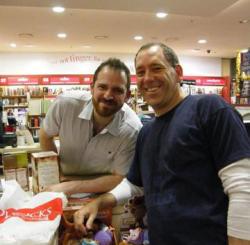 What is it you wish you knew about creating characters when you started writing?
What is it you wish you knew about creating characters when you started writing?
If you could go back in time and give your younger self some advice on the topic, what would you say?
I’d tell myself to figure out what my characters want, what they need, and to understand the difference, but that’s just a tiny part of creating characters.
Here’s some more fantastic responses to that question.
“A good character is someone who wants something and a good story is about what’s stopping them from getting it.” Dave Versace
“Don’t let your characters take your story over.” Mark Mercieca
“Don’t be afraid of letting part of yourself show up in your characters.” Glendon Perkins
“Characters are people to. They see, feel, smell, taste, hear and have emotions.” Roland Boykin
“Develop a background story for your characters. Even if you never use any of the information in your book, it’s there to help flesh out your character and will help make your characters seem real in the way they act and react to situations.” Chris Mentzer
“Your characters know themselves much better than you. You can get to know them by speaking with them, but they’ll still know better than you. They’ll do what they want. What? The hands are yours, you type up the story? Illusions, my dear.” Era Metko
“No plot survives contact with the characters.” David Friedman
“Creating a character is like digging for treasure, opening the bejeweled chest buried six feet under and seeing it holds a doorway to a secret mine of wonders right next to a sewer.” Charles Murray
“When I try to impose my own ideas on the characters without listening to them? Disaster. The story stalls out and I have to re-write, every time.” Kyra Halland
“Every character needs a goal – whether a grand life goal or just a goal for two seconds in that scene. Characters who want something are more interesting, even without dialogue. They will be proactive rather than reactive.” Madison Dusome
“We don’t create the characters; we ask and they come to us. We then wrestle them into the story and compromise when necessary.” Catherine Green
“Don’t waste too much time filling out the character description, let them come to life on the page. The character will let you know what they like or dislike.” Chantelle Griffin
“There will be moments when your characters come to life, and feel more alive than ‘real life’ people. Choosing who to spend your time with will be difficult – balance is important.” Karen Wyld
Great advice, huh? What’s your best advice on creating characters?
If you liked this post, check out some of the other posts in the “Things I Wish I Knew About” series: Author Promotion, Point Of View, Critiquing, Dealing With Rejection, Editing Your Own Work, Short Stories, Story Development, Worldbuilding and Writing.


 So here we are for another round of writerly advice from the friendly writers of Google Plus. This time I’ve asked people for their best advice on story development.
So here we are for another round of writerly advice from the friendly writers of Google Plus. This time I’ve asked people for their best advice on story development. I wish I’d known a few more things about writing when I started out, so I’ve compiled a list of useful tips and advice from other writers that might help both seasoned pros and newbies alike.
I wish I’d known a few more things about writing when I started out, so I’ve compiled a list of useful tips and advice from other writers that might help both seasoned pros and newbies alike.
 It’s amazing what providing freebie can do for you. Take Simon Haynes, for example.
It’s amazing what providing freebie can do for you. Take Simon Haynes, for example. Would I be blogging about Simon Haynes if it wasn’t for yWriter? Would someone have posted a link to my blog without my diagram?
Would I be blogging about Simon Haynes if it wasn’t for yWriter? Would someone have posted a link to my blog without my diagram?
 Just a brief announcement to say I’ve written a guest post for the CSFG Blog on
Just a brief announcement to say I’ve written a guest post for the CSFG Blog on 
 Have you ever given your stories to critiquers or beta readers in the hopes of getting some good feedback?
Have you ever given your stories to critiquers or beta readers in the hopes of getting some good feedback? Last year was a huge year in many ways. I landed an agent and kicked a bunch of other goals, all of which have moved my writing career forward in several ways.
Last year was a huge year in many ways. I landed an agent and kicked a bunch of other goals, all of which have moved my writing career forward in several ways.
 They say a picture tells a thousand words, but I disagree. I believe a picture can tell an infinite amount more.
They say a picture tells a thousand words, but I disagree. I believe a picture can tell an infinite amount more.




 The results are in!
The results are in! The Competition
The Competition
 I spent the last weekend at GenreCon in sunny Brisbane. Brisbane is incredibly pleasant for such a big city – at least where I was staying at South Bank.
I spent the last weekend at GenreCon in sunny Brisbane. Brisbane is incredibly pleasant for such a big city – at least where I was staying at South Bank.



